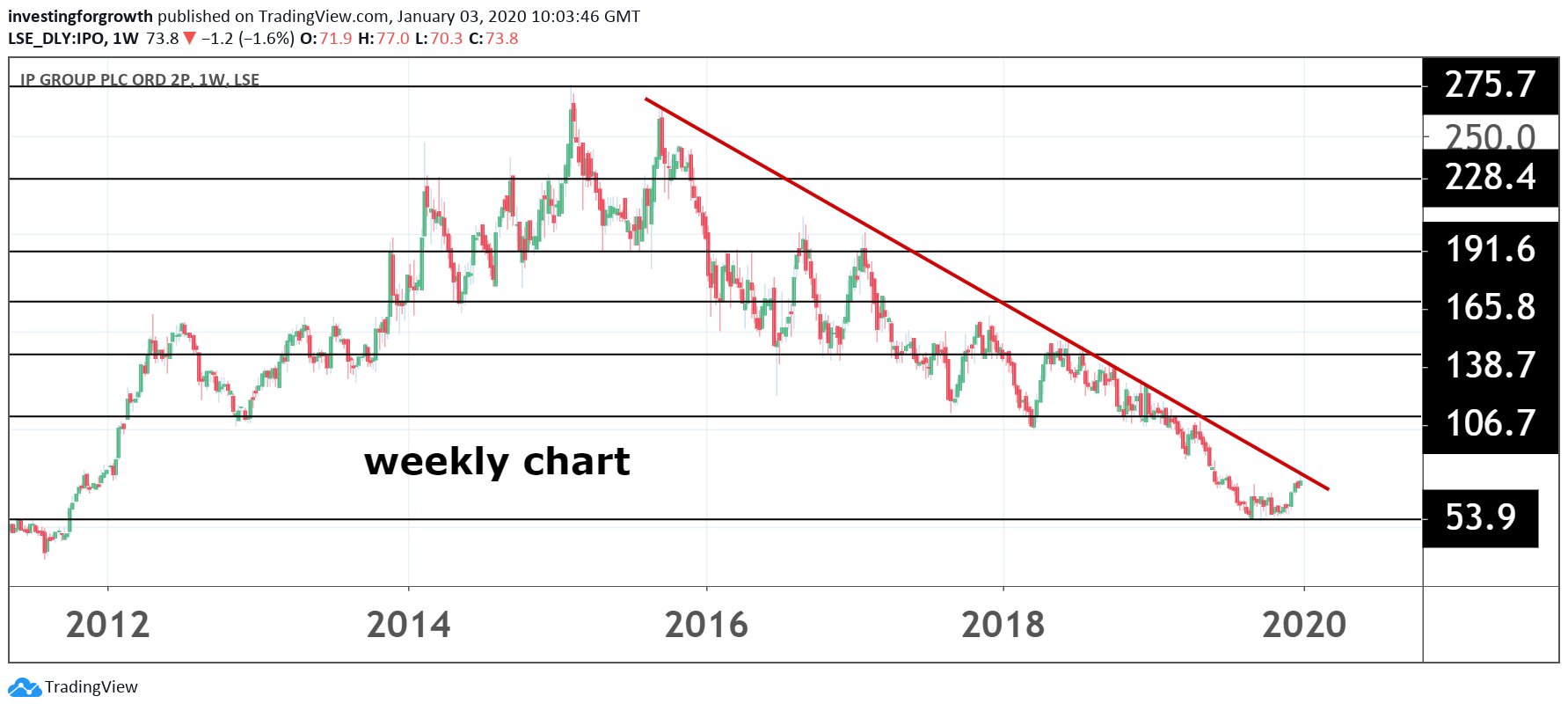Stockwatch: A contrarian buy for the 2020 decade
Trading at a massive discount to net asset value, this could be a stock to tuck away in a SIPP or ISA.
3rd January 2020 10:21
by Edmond Jackson from interactive investor
Trading at a massive discount to net asset value, this could be a stock to tuck away in a SIPP or ISA.

A 35% discount to net asset value (NAV) and inflection point for cash realisations makes this stock a prime New Year candidate for SIPPs and ISA’s.
The New Year consensus is for US equities to remain strong – as they usually do, ahead of a presidential election – with the economy also robust; and the UK market is said to be the cheapest globally, due to rise now political uncertainty is lifting. I’d be steeled for other scenarios, especially if the US market does something different and others follow.
I wrote this intro before the US assassination of Iran’s military leader overnight which raises global uncertainties, and we’ll see how risk appetite adjusts. Already, there’s been sharp hike in oil prices.
A risk of some reversion to mean values in US leaders
I rehearsed this point also before the Baghdad strike, recalling in my year-end of US share ideas that it would be best to favour leading US stocks. Yes, they did well, partly because their newsflow remained strong. However, price/earnings (PE) multiple expansion was also involved, to levels unjustified by underlying earnings growth.
I concluded with “hold” stances given it is hard to argue that such businesses will disappoint, but care is needed lest sentiment shifts and destabilises the US market.
They’re not so wholly different from the “Nifty Fifty” growth stocks which performed very strongly in the 1960s and early 1970s, when household names traded on very high valuations for years and received wisdom was to buy and never sell.
Circa 40x earnings in stocks I’ve covered isn’t so high as 70x for McDonald's (NYSE:MCD) and Disney (NYSE:DIS) traded in the early 1970s. Although without drawing too close a comparison with 4-5% rises in oil prices currently, it was a near 80% jump in 1973 that smashed the Nifty Fifty valuations. What’s also different this time is that interest rates are unlikely to rise compared with a double whammy hit to equities in the 70s.
Yet, when key US stocks break away from earnings reality it is always worth being aware of the risk to global markets, should a snap-back follow. One potential hedge is unfashionable stocks at a discount to net asset values, due chiefly to weak sentiment rather than underlying progress. This creates scope for reversion to mean values in a positive sense.
Contrarian stock at an inflection point for cash realisations
One such business is IP Group (LSE:IPO), at 73p a circa £750 million mid-cap company investing in unquoted, intellectual property-based companies. It has pioneered with UK universities, US research institutions and, since 2017, has been involved in Australia.
Such a concept isn’t wholly new; recall the “incubator funds” of the late 1990s tech boom, although sentiment towards such stocks can ebb and flow according to success stories spun out.
IP’s six-year financial record (see table below) is somewhat mixed: taking net asset value per share as its chief benchmark, this has been pretty volatile since 2013, up from 89.3p per share to 138p, bumping along to 142.3p then a drop. Yet management contends its portfolio is effectively at an inflection point as it now matures – it reports cash realisations of £45.9 million in the first half of 2019 versus £29.5 million for full-year 2018.
Since the Woodford funds debacle, unquoted company values have been called into question generally. IP’s last (end-June 2019) balance sheet had £1,172 million net assets with scant goodwill/intangibles, equivalent to 110.7p a share, hence a 35% discount currently.
I suspect accounting for unquoted valuations will always to some extent be compromised and explains why such funds should indeed trade at a discount. During economic upturn, unquoted valuations may lag realisable value (when spun off as a trade sale or flotation), but, if recession strikes, then some such fledglings will turn into pumpkins and mice. This is why stocks related to private equity investing can move significantly with general sentiment, while beating up auditors to deliver more objective figures has limited scope.
| IP Group - financial summary | ||||||
|---|---|---|---|---|---|---|
| year ended 31 Dec | 2013 | 2014 | 2015 | 2016 | 2017 | 2018 |
| Turnover (£ million) | 85.4 | 28.4 | 98.3 | 7.6 | 58.4 | -36.2 |
| Operating profit (£m) | 72.2 | 8.9 | 73.8 | -15.4 | 53.1 | -292 |
| Net profit (£m) | 73.0 | 9.1 | 73.8 | -13.6 | 49.7 | -294 |
| IFRS3 earnings/share (p) | 19.2 | 2.0 | 13.6 | -2.4 | 7.1 | -27.8 |
| Normalised earnings/share (p) | 19.2 | 2.2 | 13.6 | -2.3 | 1.9 | -15.3 |
| Free cashflow/share (p) | 6.7 | -6.7 | -7.0 | 10.4 | -3.2 | -2.4 |
| Net debt (£m) | 22.8 | 92.5 | 157 | 87.6 | 209 | 98.2 |
| Net assets per share (p) | 89.3 | 110 | 138 | 136 | 142 | 115 |
| Source: historic Company REFS and company accounts |
Bear market most likely over, post May and Woodford
So, if you think Boris Johnson’s government is genuinely going to unleash Britain’s potential in years ahead, the likes of IP are good to own after the Theresa May years contributed to uncertainty.
In a long-term chart context IP shares have ridden a rollercoaster from 30p nine years ago to over 250p in early 2015, then all the way down to 57p last November. They currently sit at about 73p. That’s too soon in chart terms to assert any turnaround, though fundamentals of a 35% NAV discount and rising cash realisations all raise the odds of one.

Source: TradingView Past performance is not a guide to future performance
The Woodford debacle has also been a key depressant lately, creating fears of an overhang in IP shares besides the unquoted valuation issues. Woodfood Asset Management became IP’s second-largest shareholder and funds (currently being wound up) had holdings in 12 of IP’s portfolio companies, accounting for 34% of IP’s portfolio value.
It might have helped for IP to make a statement clarifying how winding up Woodford funds is expected to progress: for example, there hasn’t been a regulatory news release relating specifically to Woodford. More positively, last October, a railways pension fund increased its stake from 8.5% to 15.3%, which appears to relate to Invesco (LSE:IVI) reducing from 27%.
The tendency is for market valuations to fall in anticipation of overhang issues, then re-rate afterwards, so, while the situation lacks clarity over Woodford, my gut sense is that the effect is being priced in. IP’s de-rating likely also reflects an extent of turning against unquoted company investments, although the railways pension fund purchase hints at a contrarian opportunity.
Speculative profile mitigated by NAV discount
Properly there should be a better-established record of “cash realisations from portfolio maturity” than management’s words; backed by a proven dividend payout policy. Last September’s interims showed an uninspiring 3% reduction in portfolio net fair value, and cash realisations were just £7.1 million versus £39 million applied for investments.
The cash position remains strong for new investments and fundings: £161.1 million gross, or £71.1 million net of debt as of last June. Following the return of technology transfer operations to Imperial College London, £8 million of savings are claimed in annual costs (or 0.7% of NAV).
Much of the buying case I lay out here rests on the NAV discount running too far, and the UK economy improving from Brexit-induced torpor. My argument is double-edged in the sense that any de-rating of high-priced US equities could affect risk sentiment generally, although I contend that racier growth plays would suffer most and contrarian value stocks less so.
IP’s portfolio is also pretty broad, with 61 “focus” companies representing nearly 90% of the portfolio value and 76 other companies. There are 109 based in the UK, 23 in the US and five in Australasia. Net asset value growth from 2013 to 2015 does at least imply a measure of success, backing enough genuine winners to offset inevitable also-rans and losers, able to dilute performance.
But the portfolio breakdown is also why I say shareholders are significantly taking a medium-term bet on the UK economy, which goes beyond a wave of investment money said due to flow into London equities. A commitment to the real economy is involved with this stock, though an intellectual property orientation should mitigate cyclical risks.
I also like the way “private equity” has become quite a dirty word post-Woodford, I feel this is related more to his getting over-confident and over-extended (like enough star fund managers are prone to) than a fundamental problem with the concept.
Various long-term studies show returns from unquoted company investments beating quoted companies. Obviously, the devil is in the detailed task of picking the right such funds, but I suggest a 35% NAV discount mitigates specific risk. IP is one to consider for SIPPs/ISAs as a tuck-away. Buy.
Edmond Jackson is a freelance contributor and not a direct employee of interactive investor.
These articles are provided for information purposes only. Occasionally, an opinion about whether to buy or sell a specific investment may be provided by third parties. The content is not intended to be a personal recommendation to buy or sell any financial instrument or product, or to adopt any investment strategy as it is not provided based on an assessment of your investing knowledge and experience, your financial situation or your investment objectives. The value of your investments, and the income derived from them, may go down as well as up. You may not get back all the money that you invest. The investments referred to in this article may not be suitable for all investors, and if in doubt, an investor should seek advice from a qualified investment adviser.
Full performance can be found on the company or index summary page on the interactive investor website. Simply click on the company's or index name highlighted in the article.
Disclosure
We use a combination of fundamental and technical analysis in forming our view as to the valuation and prospects of an investment. Where relevant we have set out those particular matters we think are important in the above article, but further detail can be found here.
Please note that our article on this investment should not be considered to be a regular publication.
Details of all recommendations issued by ii during the previous 12-month period can be found here.
ii adheres to a strict code of conduct. Contributors may hold shares or have other interests in companies included in these portfolios, which could create a conflict of interests. Contributors intending to write about any financial instruments in which they have an interest are required to disclose such interest to ii and in the article itself. ii will at all times consider whether such interest impairs the objectivity of the recommendation.
In addition, individuals involved in the production of investment articles are subject to a personal account dealing restriction, which prevents them from placing a transaction in the specified instrument(s) for a period before and for five working days after such publication. This is to avoid personal interests conflicting with the interests of the recipients of those investment articles.